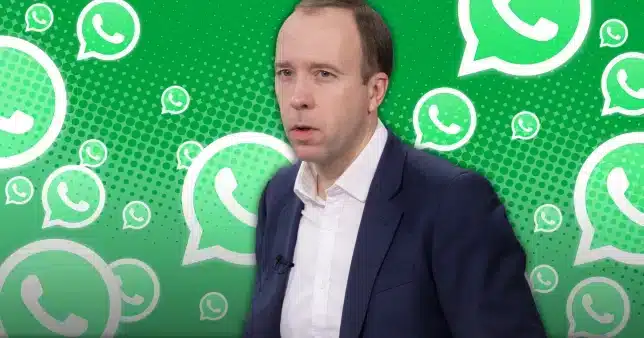The Journalist who leaked WhatsApp chats during the pandemic has been criticized by Matt Hancock, who has expressed his ‘great disappointment’ in him.
A “major betrayal and violation of trust by Isabel Oakeshott,” he claimed, was committed when she sent messages to the Daily Telegraph from his position as health secretary.
Although Ms. Oakeshott called it a “ridiculous defense,” she stood by his assertion that the public had no interest in learning the contents of the mails.
What a ludicrous defense, she opined to TalkTV.
It is blatantly ludicrous for someone as intelligent as Matt Hancock to claim that the public has no interest in these findings in a statement.
He is well aware of this.
Earlier this week around 100,000 private messages from Mr Hancock’s phone were leaked to the press.
Texts showed that Mr Hancock rejected advice to test all residents going into English care homes for coronavirus at the start of the pandemic.
Chief medical officer Professor Sir Chris Whitty told the former health secretary there should be testing for ‘all going into care homes’.

But the messages suggest he rejected the guidance, telling an aide the move just ‘muddies the waters’, and introduced mandatory testing for those coming from hospitals.
In further messages released this morning, it came to light that former education secretary Sir Gavin Williamson said some schools wanted to close during the pandemic so staff would have an ‘excuse’ not to work.
They show Mr Williamson asked the then health secretary for help securing PPE for schools, adding: ‘Some will just want to say they can’t [open] so they have an excuse to avoid having to teach, what joys!!!’
Ms Oakeshott said she would not get involved in a ‘slanging match’ with Mr Hancock ‘because it wouldn’t be pretty’.
‘He can threaten me all he likes,’ she told BBC Radio 4’s Today.
‘There are plenty of things I can say about his behaviour, by the way, that I’m not going to do – at least not at this stage – because this is not about Matt Hancock. It is so much bigger than that.’
Pressed on her claim about the message he sent her, Ms Oakeshott said: ‘I’m saying that he sent me a message at 1.20am in the morning. It wasn’t a pleasant message.’
Explaining why she had breached a non-disclosure agreement to hand the cache of WhatsApp messages to the Telegraph, she said it was not motivated by money.
‘Anyone who thinks I did this for money must be utterly insane,’ she said.
‘This is about the millions of people, every one of us in this country that were adversely affected by the catastrophic decisions to lock down this country repeatedly, often on the flimsiest of evidence for political reasons.’
In a statement this morning Mr Hancock said: ‘I am hugely disappointed and sad at the massive betrayal and breach of trust by Isabel Oakeshott.
‘I am also sorry for the impact on the very many people – political colleagues, civil servants and friends – who worked hard with me to get through the pandemic and save lives.
‘There is absolutely no public interest case for this huge breach. All the materials for the book have already been made available to the Inquiry, which is the right, and only, place for everything to be considered properly and the right lessons to be learned.
‘As we have seen, releasing them in this way gives a partial, biased account to suit an anti-lockdown agenda.
‘Isabel and I had worked closely together for more than a year on my book, based on legal confidentiality and a process approved by the Cabinet Office.

‘Isabel repeatedly reiterated the importance of trust throughout, and then broke that trust.
‘Last night, I was accused of sending menacing messages to Isabel. This is also wrong.
‘When I heard confused rumours of a publication late on Tuesday night, I called and messaged Isabel to ask her if she had ‘any clues’ about it, and got no response.
‘When I then saw what she’d done, I messaged to say it was ‘a big mistake’. Nothing more.
‘I will not be commenting further on any other stories or false allegations that Isabel will make.
‘I will respond to the substance in the appropriate place, at the inquiry, so that we can properly learn all the lessons based on a full and objective understanding of what happened in the pandemic, and why.’

